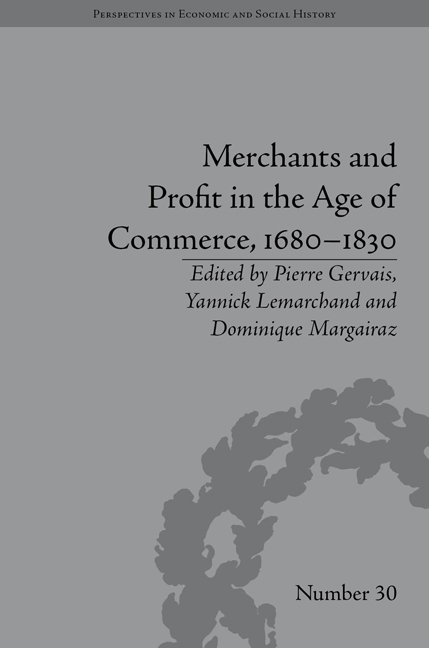Book contents
- Frontmatter
- CONTENTS
- Acknowledgements
- List of Contributors
- List of Figures and Tables
- Introduction: The Many Scales of Merchant Profit: Accounting for Norms, Practices and Results in the Age of Commerce
- Part I Understanding Merchant Transactions
- Part II The Credit Nexus and its Pitfalls
- Part III Beyond Price Signals: The Institutional Framework
- 5 The Transatlantic Flow of Price Information in the Spanish Colonial Trade, 1680–1820
- 6 Product Quality and Merchant Transactions: Product Lines and Hierarchies in the Accounts and Letters of the Gradis Merchant House
- Part IV Diversification and Risk Management
- Conclusion: Reorienting Early Modern Economic History: Merchant Economy, Merchant Capitalism and the Age of Commerce
- Notes
- Index
6 - Product Quality and Merchant Transactions: Product Lines and Hierarchies in the Accounts and Letters of the Gradis Merchant House
from Part III - Beyond Price Signals: The Institutional Framework
- Frontmatter
- CONTENTS
- Acknowledgements
- List of Contributors
- List of Figures and Tables
- Introduction: The Many Scales of Merchant Profit: Accounting for Norms, Practices and Results in the Age of Commerce
- Part I Understanding Merchant Transactions
- Part II The Credit Nexus and its Pitfalls
- Part III Beyond Price Signals: The Institutional Framework
- 5 The Transatlantic Flow of Price Information in the Spanish Colonial Trade, 1680–1820
- 6 Product Quality and Merchant Transactions: Product Lines and Hierarchies in the Accounts and Letters of the Gradis Merchant House
- Part IV Diversification and Risk Management
- Conclusion: Reorienting Early Modern Economic History: Merchant Economy, Merchant Capitalism and the Age of Commerce
- Notes
- Index
Summary
While quality appears as a crucial concern in early modern systems of control and regulation, in market ‘policing’, and in the dynamics of pre-industrial growth, historians have only recently come to focus on what was a key element of exchange operations and market growth. The issue of food quality has attracted researchers, particularly with respect to the interplay between public health concerns on one hand, and on the other hand references to honesty in transactions and the management of legal conflicts and violations stemming from fraud or adulteration of goods offered for sale. In the latter vein, after several decades of work on consumption, researchers have concluded that traded objects were increasingly numerous, and the product lines increasingly diversified – an observation which has given rise to a whole series of discussions around quality in terms of innovation, productive organization and market strategies. At the crossroads of the avenues of inquiry opened by economics of convention and the anthropological approach to objects, historians interested in taxonomy issues also explored the formal investments the various actors agreed to when they generated a hierarchy of merchandise within which the interaction between similarity and singularity under pinning market segmentation and the dynamics of trade could be played out.
There has not been much research, however, on the way quality performed within the process of coordination between actors, maybe because the abundant literature on merchant networks obscured the extent to which the topic could be a fruitful one.
- Type
- Chapter
- Information
- Merchants and Profit in the Age of Commerce, 1680–1830 , pp. 115 - 132Publisher: Pickering & ChattoFirst published in: 2014



